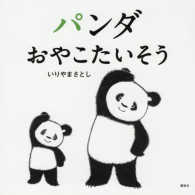- ホーム
- > 洋書
- > 英文書
- > Philosophy
Full Description
Was humanity created, or do humans create themselves? In this eagerly awaited English translation of Le Règne de l'homme, the last volume of Rémi Brague's trilogy on the philosophical development of anthropology in the West, Brague argues that, with the dawn of the Enlightenment, Western societies rejected the transcendence of the past and looked instead to the progress fostered by the early modern present and the future. As scientific advances drained the cosmos of literal mystery, humanity increasingly devalued the theophilosophical mystery of being in favor of omniscience over one's own existence. Brague narrates the intellectual disappearance of the natural order, replaced by a universal chaos upon which only humanity can impose order; he cites the vivid histories of the nation-state, economic evolution into capitalism, and technology as the tools of this new dominion, taken up voluntarily by humans for their own ends rather than accepted from the deity for a divine purpose.
Brague's tour de force begins with the ancient and medieval confidence in humanity as the superior creation of Nature or of God, epitomized in the biblical wish of the Creator for humans to exert stewardship over the earth. He sees the Enlightenment as a transition period, taking as a given that humankind should be masters of the world but rejecting the imposition of that duty by a deity. Before the Enlightenment, who the creator was and whom the creator dominated were clear. With the advance of modernity and banishment of the Creator, who was to be dominated? Today, Brague argues, "our humanism . . . is an anti-antihumanism, rather than a direct affirmation of the goodness of the human." He ends with a sobering question: does humankind still have the will to survive in an era of intellectual self-destruction? The Kingdom of Man will appeal to all readers interested in the history of ideas, but will be especially important to political philosophers, historical anthropologists, and theologians.
Contents
Introduction
Part One: Preparation
1. The Best Of The Living Things
2. Domination
3. Three Incomplete Prefigurations
4. Metaphorical Dominations
5. The New Lord Of Creation
6. Attempts And Temptations
Part Two: Deployment
7. The Formation Of The Modern Project
8. The Beginnings Of The Realization
9. The Master Is There
10. Moral Dominion
11. The Duty To Reign
12. The Iron Rod
13. The New Meaning Of Humanism
14. The Sole Lord
Part Three: Failure
15. Kingdom or Waste Land?
16. Man, Humiliated
17. The Subjugated Subject
18. Man Remade
19. Man Surpassed and ... Replaced
20. Checkmate?
21. Lights Out
Conclusion







